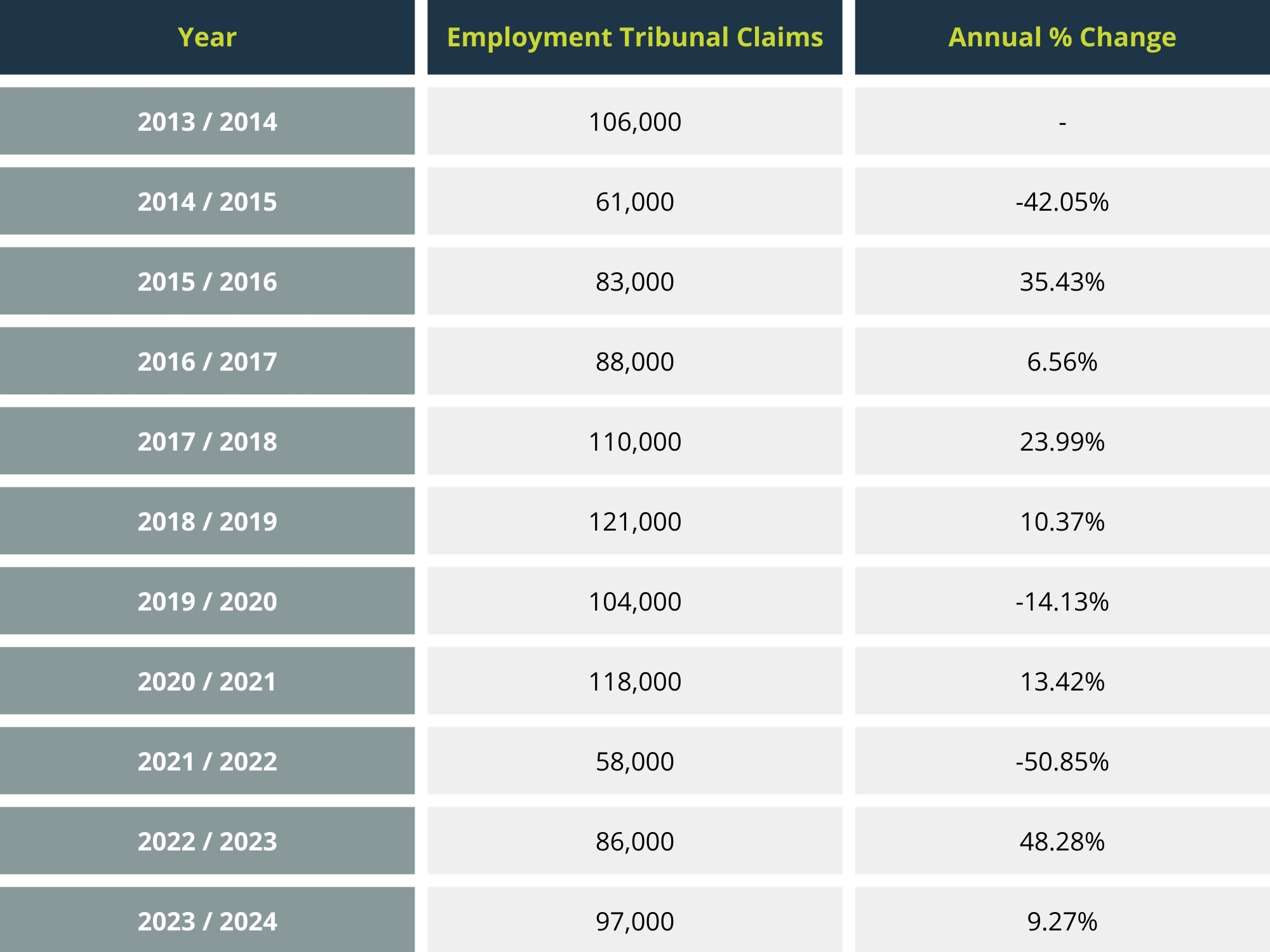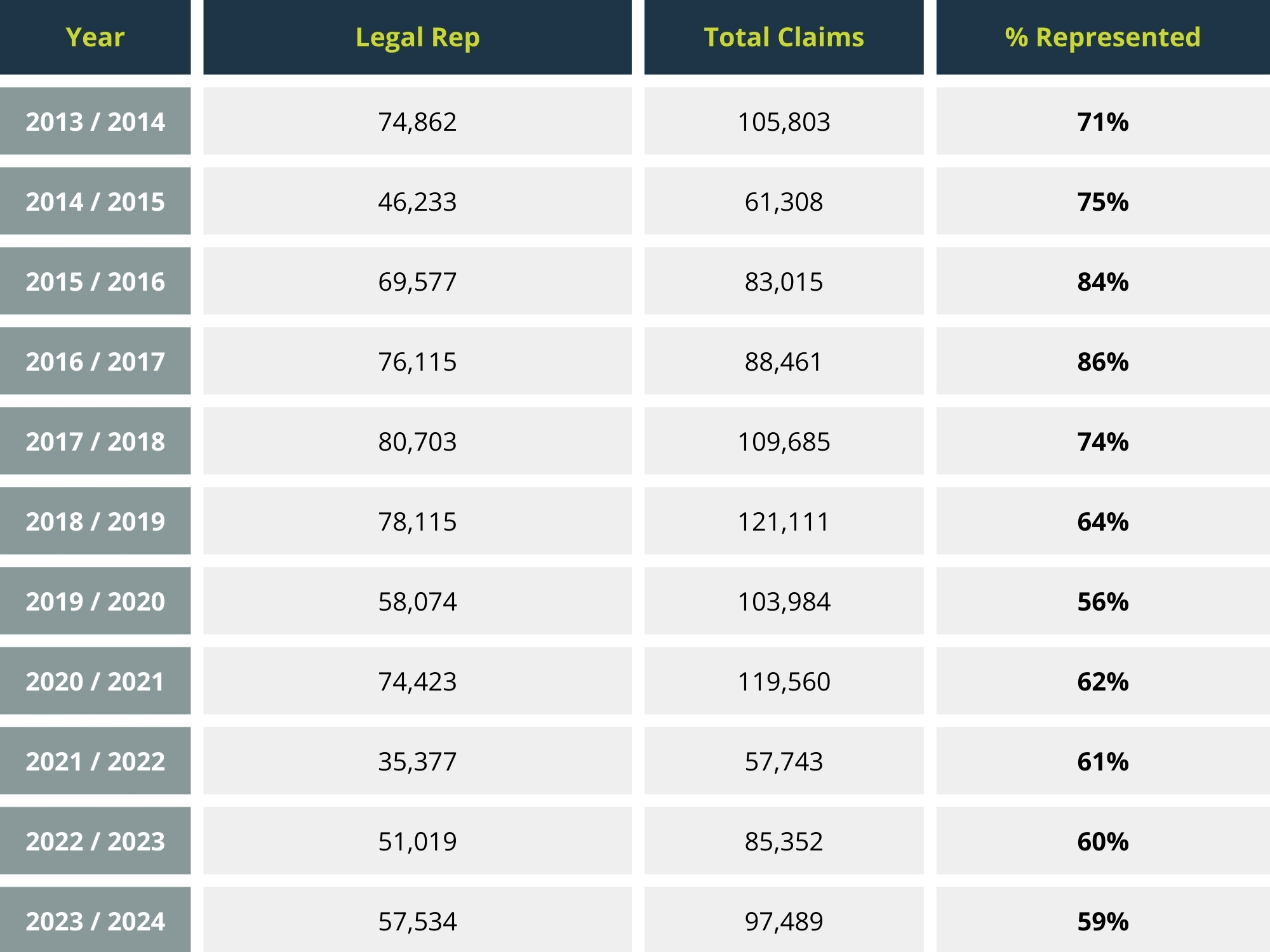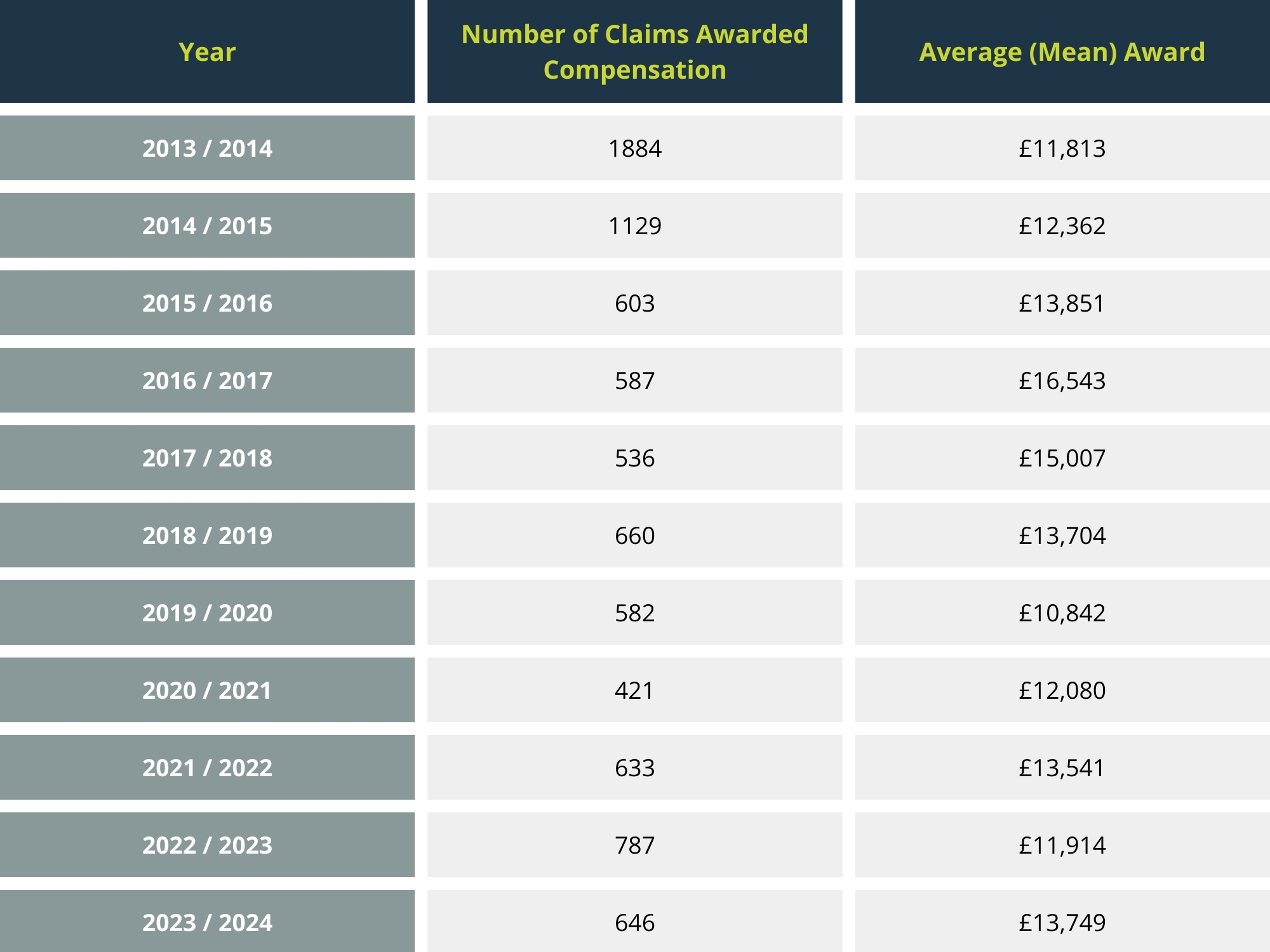The relationship built between employee and employer is very important for a happy and functional work environment. However, disputes can arise between employer and employee, making the working relationship strained and difficult to navigate at times.
While many differences of opinion can be ironed out through meetings and finding a suitable compromise for both parties, if an employee considers that their employer is breaking employment law principles, then they may decide to take them to court in what is called an 'employment tribunal' for workplace disputes.
There are many reasons why an employee might take their employer to tribunal, such as failure to pay wages, disputes over working hours, or if they consider they have been unfairly dismissed from their employment. However, employers will have the chance to defend any such claims, with the intention behind the tribunal process being to fairly balance the relationship between employee and employer, seeing that the rights of both parties are upheld.
We were curious to find out just how many employment tribunals take place each year in the UK, and whether or not this figure is increasing. We also wanted to uncover which employment tribunal claims are the most common. So, read on to discover the UK employment tribunal landscape.
ACAS
When an employee wants to make a claim against their employer at an employment tribunal, in most cases they first must notify ACAS – the Advisory, Conciliation and Arbitration Service. ACAS offers early conciliation to try to reach an amicable agreement between employee and employer, avoiding the need for the employee to then issue their claim with the employment tribunal.
We thought that, as a first step, it would be useful to review the ACAS early conciliation data, to get a better understanding of the number of workplace disputes being reported to ACAS, and how many of these progress past early conciliation to the tribunal stage.
Early conciliation notifications
Between April 2023 and March 2024, there were 97,958 employee-led ACAS early conciliation cases. The breakdown of these cases shows a steady rise in notifications throughout this period – with 23,116 being made in the first quarter of the year, compared with 25,824 in the fourth, and final, quarter.
Employers are also able to make an early conciliation notification, but these made up a very small percentage of around 6% of all cases in this financial year. 5,370 employer-led notifications were recorded over the 12-month period.
Early conciliation outcomes
In the four quarters, just over 20% of early conciliation cases were closed without parties even engaging in early conciliation. To confirm, this is when ACAS is unable to get in touch with the party who has contacted them, when seeking to gather information about the complaint.
The percentage of cases that did not progress to an employment tribunal claim remained steady throughout the 12 months, with this figure never dropping below 65%, nor rising above 70%. The total number of tribunal claims avoided in the early conciliation stage in the period has been calculated as 49,577, of which more than 9,000 were settled directly through ACAS.
If a case is not resolved by ACAS early conciliation, an employee can then submit an employment tribunal claim.
ACAS continues to offer their services beyond the initial early conciliation stage, and they have calculated that 76% of all claims during this 12-month period did not progress to a final hearing. Of this figure, over 15,000 claims were settled by ACAS (equivalent to around 70% of all claims that did not progress), and a further 6,300 were withdrawn.
Conclusions
In conclusion, the statistics demonstrate that ACAS remains highly effective in reducing the number of employment tribunal claims. By offering mediation and alternative dispute resolution services, ACAS facilitates the resolution of workplace conflicts before they escalate further and without the need for legal recourse to the tribunal. This not only saves time and resources for both employees and employers but also helps maintain a more manageable level of claims in the judiciary system. The high volume of complaints that are shown to never reach the employment tribunal when considering the numbers contacting ACAS, highlights the crucial role that ACAS plays in fostering a more collaborative approach to resolving employment disputes, and that it remains an effective mechanism for reducing unnecessary tribunal claims.
Employment Tribunals
Claims to employment tribunals
Current and former employees can take their employers to tribunal for all manner of reasons. Here, we’ll take a closer look at several causes of employment disputes, finding out which are the most common both in the long and short term.
Changes to the number of employment tribunals since 2013/14
Here you can see the number of employment tribunal claims received each year, going back as far as 2013/14, rounded to the nearest thousand and inclusive of group claims.
Change in the last ten years
The total number of yearly employment tribunal claims being issued to the employment tribunal has dropped by 9,000 in comparison with a decade ago, which equates to 8.49%. This is a significant decrease, and this could suggest either that employees are happier and have less to complain about, or that the process for taking an employer to tribunal has become more obscure, time consuming or slow. The dip in claims being issued between 2013/2014 and 2016/2017 is likely to be reflective of the introduction of employment tribunal fees to issue a claim during this period – claims rose rapidly following the end of this regime. It will be interesting to see what the impact of re-introduction of employment tribunal fees, if this currently debated change is put into place, has.
You will also note a significant anomaly in 2021/22 – we would put this down to the ongoing pandemic, with the numbers beginning to rise once again following this period and returning closer to pre-pandemic levels.
Representation of claimants
We also wanted to analyse the statistics behind the representation of claimants. Obtaining ongoing legal representation throughout a tribunal process has its associated costs, and many individuals will therefore not be in a position to benefit from this. 59% of claimants were legally represented in the most recent data set of 2023/24, however this is a vast contrast from the 86% in 2016/17. The statistics show a trend – during the period referenced above where a fee was due when issuing a claim, the percentages of legal representation rose drastically. Soon after fees were removed again, the figures returned to previous levels, hovering around 60% in recent years, very similar to the percentages of pre-2013.
Unfair Dismissal
Unfair dismissal remains one of the most frequently brought claims in the employment tribunal, with many notable trends over the years. Between 2007 and 2013, more than 2,000 successful claims were filed annually. However, this number subsequently dropped significantly, once again as a result of the introduction of tribunal fees, stabilising at around 600 claims per year for the rest of the decade.
Since the pandemic, there's been a notable rise in successful claims of this type, with 2022/23 seeing the highest number of successful claims in almost a decade (787). The post-pandemic increase likely reflects the economic instability and resultant redundancies and dismissals during the pandemic, coupled with an increased awareness of employee rights.
However, the 2023/24 statistics, with 646 successful claimants receiving compensation, suggest the numbers could be returning back closer to precedent figures with the pandemic now, thankfully, further behind us.
In terms of compensation for successful claimants, the average award has fluctuated over the years, increased in more recent years largely driven by inflation. In 2023/24, the average payout was £13,749, but the highest on record remains for the period of 2016-2018. This potential for an upward trend in awards, to reflect the growing financial impact of unfair dismissal claims, highlights the importance of due process being followed.
Discrimination
The statistics released for 2023/2024 had a strong focus on awards for claims of discrimination. These statistics help us gain some insight as to discrimination in the workplace, and by analysing these trends, we are able to take note of areas that may require further attention by employers (of course this only being a potential indication, given not all situations of discrimination result in tribunal claims and, as noted above, many claims are settled pre-tribunal stage).
Disability Discrimination
Disability is the protected characteristic that by far provides the highest number of successful discrimination claims each year, with there being 124 successful claims of disability discrimination in 2023/24. These figures have remained relatively stable over the past decade, with a slight increase in the years following the pandemic. Last year (2022/23) saw the highest number of successful claims on record, however this year’s statistics suggest the numbers may be returning to pre-pandemic levels.
Despite this, the most recent average award figure being £44,483 suggests that when claims are made, significant compensation is often awarded. This type of discrimination frequently ranks first in terms of highest average compensation for discrimination claims in any given period, and as such employers should ensure that they are providing the necessary support to employees with disabilities and making reasonable adjustments where possible to assist them at work.
Sex Discrimination
The data shows a consistent rise in successful sex discrimination claims over the past few years, with 71 successful claims recorded in the latest period. The average compensation award spiked at £53,403 in the latest statistics, and this figure has been consistently (and significantly) rising over the past 5 years, from a low of just £8,774 in 2018/19.
This trend could be attributed to heightened awareness and focus on gender equality in the workplace, as well as there being greater scrutiny of employers in recent years, with new stories commonly featuring content on this type of discrimination in the workplace, potentially prompting more employees to come forward with their claims.
Race Discrimination
In recent years, race discrimination claims have also risen, with a total of 52 successful claims awarded compensation in the most recent period. This number has been rising since 2018, which saw just 22 successful claimants.
The average award has also trended in the same direction, with £29,532 being the most recent figure, highlighting significant cases resulting in higher compensation.
In terms of the steps that employers can take in this respect, it is crucial to consider investing in training programs focused on equality and inclusion, which can help deal with potential issues before they escalate into formal disputes. Maintaining an up-to-date Equality, Diversity and Inclusion Policy is also key in ensuring that employees are aware of their ongoing obligations.
Age Discrimination
Interestingly, age discrimination saw only 12 successful claims of this nature in the most recent financial year. This in itself is not unusual, with there being an average of 11 successful claims each year over the last decade. Rather staggeringly however, the average award was just over six figures, sitting at £102,891. It would be reasonable to consider this statistic as a slight anomaly however, as the average award has remained under the £40,000 mark for the last decade.
Recent campaigns (such as Age Without Limits) which aim at highlighting the requirement for employers to tackle bias or prejudices in relation to age in the workplace to protect workers from discrimination could be considered one of the reasons behind the steady number of successful claims. However it is evident that employers that breach this new duty are receiving significant financial penalties.
Sexual Orientation Discrimination
This data reveals yet more fascinating trends. The number of successful claims linked to sexual orientation has not reached double figures for over a decade. However, the average compensatory award is often amongst the highest of all of the discrimination types. This year saw 7 successful claims, with an average of £27,070 awarded in compensation.
The lower number of claims for this protected characteristic, it is hoped, indicates an acceptance and inclusivity for all individuals, regardless of sexual orientation, is commonplace within the workplace.
Religious Discrimination
Religious discrimination was the protected characteristic that saw the fewest successful claims in the most recent reporting period, with only 3 successful claims noted. Of these 3, the average award was £10,750, ranking as the lowest average of all of the types of discrimination claims that can be brought before the tribunal.
One hopes that this lower level of successful claims might reflect improved understanding and acceptance of diverse religious practices in the workplace, as well as effective adjustments made by employers to support their staff’s religious beliefs.
Conclusions
When analysing the statistics behind the various types of discrimination claims, one can draw many inferences from the significant trends revealed. That being said, it is important to note that the statistics only provide an indication of where employers are potentially falling short of their legal obligations, and, therefore, where further steps should be taken in order to prevent discrimination in the workplace.
The ever-increasing awareness of discrimination issues, combined with the potential for substantial compensation, may lead to individuals feeling more empowered now to challenge acts of discrimination – the increases shown in the statistics suggest that this could be the case. This trend is encouraging and emphasises the importance of employers taking proactive measures to prevent discrimination in the workplace. By implementing robust diversity and inclusion initiatives, providing training, and ensuring compliance with the relevant legislation, businesses can benefit from an improved workplace culture, productivity, and employee satisfaction.
Methodology
We wanted to find out how many employment tribunals occur in the UK, and why. We looked at the UK Government data detailing all employment tribunals for the last 10 years, looking for trends over this time period as well as since the Coronavirus pandemic.
The data allowed us to compare success rates in hearings and in achieving a settlement, as well as enabling us to track changes in the makeup of employment tribunals over time. This meant we could see which employment tribunal claims are becoming more or less common, and which claims have the highest success rates to date for employees bringing such claims.
Sources
- Early conciliation and employment tribunal data for England, Scotland, and Wales: January to March 2024 | Acas
- Tribunal Statistics Quarterly: January to March 2024 - GOV.UK (www.gov.uk)
The information provided in this article is provided for general information purposes only, and does not provide definitive advice. It does not amount to legal or other professional advice and so you should not rely on any information contained here as if it were such advice.
Wright Hassall does not accept any responsibility for any loss which may arise from reliance on any information published here. Definitive advice can only be given with full knowledge of all relevant facts. If you need such advice please contact a member of our professional staff.
The information published across our Knowledge Base is correct at the time of going to press.







